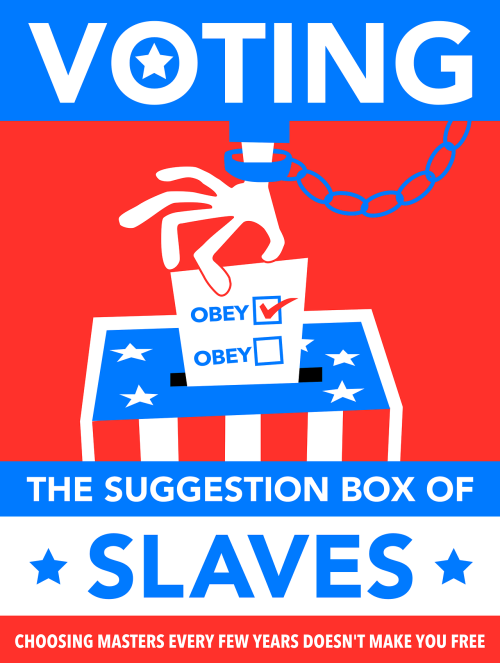
The most common argument against voting third party seems to be that “you’re throwing your vote away” because a third party doesn’t have a chance of winning. OR that a vote for a third party is actually a vote for insert-awful-candidate-here.
I want to show how both of these arguments are (usually) mathematically inaccurate.
First, let’s do a quick overview of how presidential elections work in the United States. In order to win, a candidate must receive 238 electoral votes.
The popular vote doesn’t matter.
The majority of states are winner-take-all. The only exceptions are Maine and Nebraska; which can split their electoral votes.
Is there such a thing as a wasted vote?
I would propose that if there is, that the way you would define it wouldn’t be voting for someone that has no chance of winning, I would define it as a vote that doesn’t have any impact. (And yes, that does sound an awful lot like all votes are wasted — but hold on, hear me out)
I live in Tennessee, so I am going to use it as an example. Tennessee has 11 electoral votes, and is a winner-take-all state. Tennessee has gone Republican for the last four elections in a row, and the current polls put Trump ahead of Clinton at 55-37. Tennessee will not be going for Clinton. It's just not going to happen. Which means that if you vote for Clinton or Trump… either way it doesn’t matter. All 11 electoral votes are going to Trump no matter what button you push come November. Or if you don’t push any buttons at all. That means a Clinton or Trump vote both have literally no impact, and therefore (in my opinion) would be wasted.
The interesting thing is I hardly know anybody in Tennessee who actually wants Trump. Nor do I know any who actually want Clinton. Almost without exception, everyone I personally know who has decided to vote one way or the other claims their reason is that they are voting against the other, and they are choosing the lesser of two evils.
But like I said… mathematically speaking, it doesn’t matter. Press whichever button you want, and all 11 electoral votes — which are the only ones that count in determining the outcome — are all going to go to Trump.
What about not voting at all?
I understand the thought process behind not voting at all. My friend @lukestokes leans more and more as a proponent of this approach, and I highly respect his opinions. However, the issue with that (again, in my opinion) is that the average person can’t tell by looking at the voting statistics whether a person didn’t vote because they are apathetic/don’t care/aren’t involved OR if it’s an active choice to protest the system. I would say that the average person is much more likely to assume the former over the latter. I would also guess that that is probably accurate -- that the majority of people who don't vote don't do so because they don't care. The number who don't vote due to active protest may not even be in the single digit percentages.
Here’s the case for voting third party, as I see it, even though a third party is highly unlikely to win:
It is specifically to record and demonstrate opposition to the two party duopoly. What if third party candidates got a total of 15-20+ percent of the popular vote this year? If that happened (and let’s assume no third party gets any electoral votes at all in that scenario) think about the implications for the next election. People actually see on paper a large percentage are fed up enough with the two party system that they actually got off the couch and recorded an opposition vote against what has been presented to us as the only viable choices.
The higher that number is, the more confidence people have next time around that people are waking up and don’t have to only choose between R & D anymore.
If you live in a swing state, I understand how you may feel pressured to vote R or D out of fear, especially if you’re voting against who you fear most, rather than for someone you don’t really believe in — but even in that instance, I would say this: If the votes are close enough, there will be recount after recount and the courts will decide anyway — in which case your vote still isn’t actually going to matter. It’s going to come down to who has the best legal team and/or who is better at cheating to come out on top.
If you’re dead set against voting for any of the candidates, Libertarian or Green Party included, I would ask you to consider still showing up and vote, and do a write in. Write in your own name. If not your own name, just write in “none of the above”. Just anything that shows that you are against what has been presented to us as the only two choices that count. For those of you who actively don't vote as an act of opposition, imagine if a large enough percentage of you showed up and all did a write in for "none of the above"? That could make a huge statement as opposed to simply a higher percentage not turning out, which just continues to communicate the idea that people are becoming increasingly apathetic.
Best of luck come November. I hope you consider not wasting your vote on Republicans or Democrats this time around.
If you don't live in a swing state, it should be an especially easy action to take, now that you are aware that you are statistically far more likely to be hit by lightning on the way to vote than you are to have any effect whatsoever on the allocation of electoral votes for your state.
